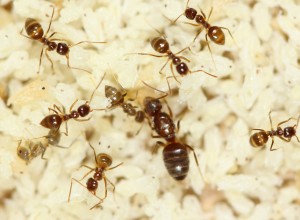

We’re used to all kinds of bugs and pests here in Brevard County, Florida. In fact, if it bites, flies, buzzes, slithers or crawls, we’ve probably gotten a call on it at one time or another. And we’re used to ants. But there’s a new type of ant invading Florida that can cause some serious structural and electrical damage to the home. It’s called the tawny crazy ant. It’s also known by the name Caribbean crazy ant or the raspberry crazy ant, but the official name is the Nylanderia fulva.
Originally from South America, these ants get their name from the crazy jerky way they move. They were first thought to enter the United States through New Orleans back in around the year 2000 and are now present throughout most of the Southern United States, including Florida.
It appears that when the crazy ant and the fire ant inhabit the same general area, they begin to fight each other for control. The fire ant usually loses and the crazy ant takes over. This is because the crazy ant can cover itself in formic acid, which essentially repels the fire ant venom.
Due to the issues related to fire ants, this may initially sound like good news. It’s not. In areas where the fire ants have been eradicated, homeowners usually state they’d prefer to have the fire ant back instead of the crazy ant. This is because the crazy ant colony is invasive. They attack and kill populations of local pests, including centipedes, ants and spiders, which can wreak havoc on a local ecosystem that requires these pests to remain in balance. They are even known to attack larger animals such as chickens or cattle, causing untold amounts of damage.
And for some reason – they love electrical equipment. They have been known to overtake transformers, air conditioners, and other pieces of electrical equipment. They chew on the insulation, chew on the wires and leave enough detritus to short-circuit just about anything. In fact, in one year alone in Texas, they are reported to have caused an estimated 146 million dollars of electrical damage.
They have multiple queens in a colony, are not attracted to over-the-counter ant bait and are resistant to conventional treatment. They make homes under rocks and can form a colony 100 times the size of a fire ant colony. This means that if a colony actually takes root in your backyard, getting rid of it is almost impossible. It is not unusual for exterminators to take out garbage bags full of dead ants when treating a colony that have settled in.
